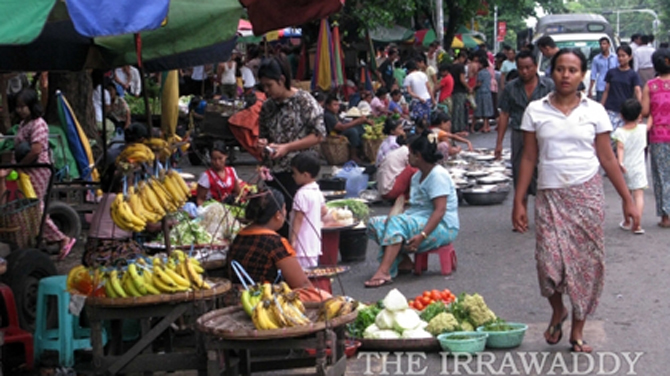As World Bank officials prepare to start helping Burma overcome years of financial mess and debt, another organization warned of threats that could still derail the country’s reform process.
The threats could not only halt domestic reforms but also re-freeze the thaw in relations between Burma and the West, said the New York-based Asia Society.
“There are two potential spoilers in the government: the corrupt remnants of the old order and the government party, the Union Solidarity and Development Party,” said the well-known non-profit educational organization.
“The interests of the first group are threatened primarily by economic reforms that could inhibit their opportunities for raking in payments from trade and investment. The second group is likely to see its interests threatened by a resurgent NLD,” the Society said, referring to Burma's leading opposition party, the National League for Democracy.
“Both groups could easily find common cause,” it added.
But rogue generals are not the only obstacle. The complicated legal web surrounding US sanctions could take years to unravel, the Society warned.
The World Bank team heading for Burma will at this stage only advise on restructuring the country’s banking system. This limited involvement is now possible because the United States, a dominant World Bank member, has given its nod of approval. But Washington will not—yet—permit any lending by the World Bank or the International Monetary Fund.
Washington and its Western allies have made it clear they will wait until after forthcoming parliamentary by-elections, in which pro-democracy leader Aung San Suu Kyi is participating, before condoning any financial loans or grants.
And there is the matter of the tens, if not hundreds, of millions of dollars in loan money still owed by Burma to the international financial institutions going back over 25 years.
Burma’s full rehabilitation into the international financial system is for the time being still stymied by US economic sanctions, which include a global block on all transactions with Burma in US dollars.
The former British government ambassador to Thailand and Vietnam, Derek Tonkin, last week urged the United States to end its block on Burma using US dollars.
“It is indiscriminate in its targeting and impacts the entire economy,” said Tonkin, who is now chairman of the Britain-based NGO Network Myanmar.
“It needs to be eased as soon as possible so that aid, trade and investment flows can be facilitated,” he said in a statement on the Network Myanmar website.
However, experts at the Center for Strategic and International Studies in Washington think unraveling the “spaghetti bowl” of sanctions imposed since 1988 will be “phenomenally difficult and slow”.
In some cases, such as Washington’s lifting of a ban on the World Bank engaging with Burma, change can be made by presidential waiver. But in many other cases it could take years, says a new report by Murray Hiebert, the deputy director of the Center’s Southeast Asia Program, and fellow researcher Tracy Quek.
“Lifting a particular sanction will involve consultations between the administration and Congress,” they said. “In the cases of sanctions imposed earlier against countries such as South Africa, Vietnam, Indonesia and Iraq, easing economic restrictions took years.”
Hiebert and Quek describe the lifting of a bar on the World Bank and the IMF as “very limited” since it lasts only until September this year.
“The US Congress will also face a challenge removing sanctions because of the overlapping provisions of the laws and executive orders of the current sanctions regime,” the Hiebert-Quek report said.
“Congress could come under heavy pressure not to lift sanctions from human rights groups that argue that reforms in Myanmar [Burma] have not gone far enough and could still be reversed.”
The US dollar sanction additionally inhibits European Union financial bodies from helping Burma because of their intertwining links with the American currency and the risk of running foul of the US legal system.
The task facing the World Bank advisory team is daunting after decades of financial mismanagement and abuse by the military.
“As the [Burmese] reformers pursue macroeconomic reforms of the banking, fiscal and currency systems, they are realizing how very difficult it will be to untangle and correct the deeply flawed and corrupt systems that have underpinned the military economy for decades,” said the Asia Society in its own report following a visit to Burma.
“Moreover, their early attempts at economic reform are constantly being sabotaged by those who have a vested interest in retaining corrupt practices.

